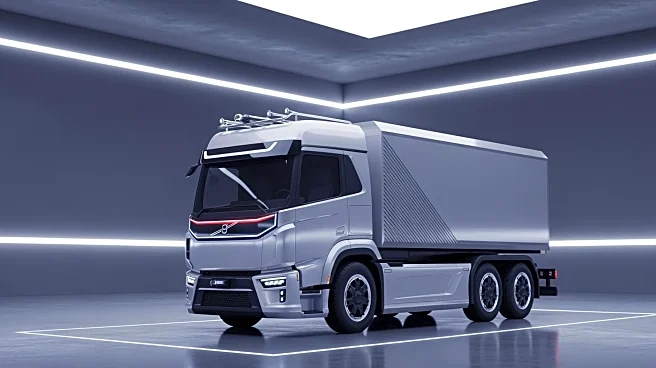What's Happening?
Volvo and Waabi have unveiled a new autonomous trucking solution, integrating Waabi's AI technology with Volvo's VNL Autonomous truck. This collaboration marks a significant step towards Level 4 autonomy, where trucks can operate without human intervention
under specific conditions. The Volvo VNL Autonomous is produced at Volvo's New River Valley plant in Virginia, equipped with six redundant systems to ensure safe driverless operations. The partnership aims to address the growing demand in the U.S. freight market, which faces a shortage of qualified drivers. By leveraging AI-powered autonomous trucks, Volvo and Waabi seek to maintain the flow of goods efficiently and safely.
Why It's Important?
The introduction of autonomous trucks by Volvo and Waabi is poised to transform the U.S. freight industry, which is currently challenged by driver shortages and increasing demand. These AI-driven trucks can operate longer hours than human drivers, potentially reducing shipping delays and lowering transportation costs. Moreover, automation could enhance highway safety by minimizing fatigue-related accidents. However, the shift towards driverless freight raises concerns about employment, as trucking employs millions of drivers nationwide. Labor groups and state officials are advocating for retraining programs to help workers transition to new roles supporting automation.
What's Next?
As Volvo and Waabi continue to develop their autonomous trucking platform, the focus will be on achieving broad commercial deployment. This involves overcoming regulatory hurdles, ensuring data privacy and cybersecurity, and building public trust in autonomous vehicles. The companies are working on transparency and safety trials to demonstrate the reliability of their technology. Additionally, the economic and social implications of automation will require careful management to balance innovation with workforce impacts.
Beyond the Headlines
The move towards autonomous trucking not only addresses logistical challenges but also sparks broader discussions about the future of transportation and employment. As AI technology advances, it is crucial to consider ethical and legal dimensions, such as data privacy and the certification of autonomous systems. Public perception will play a significant role in the adoption of driverless trucks, necessitating clear communication and responsible testing to build confidence among road users.















